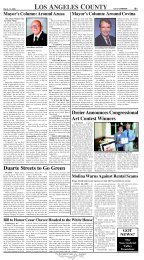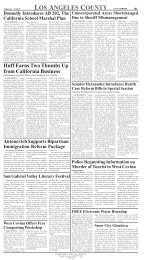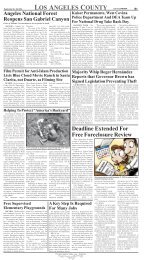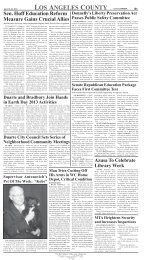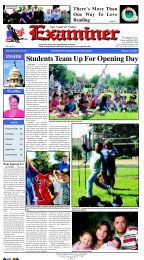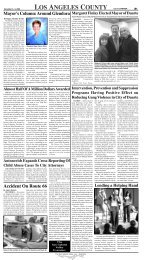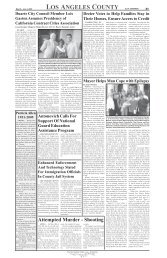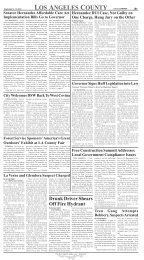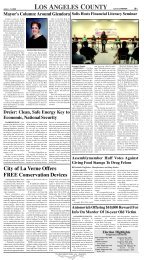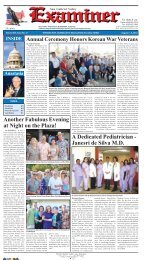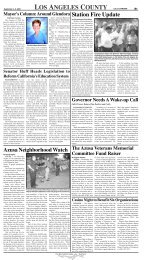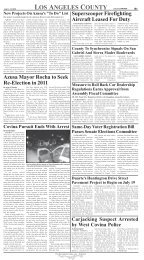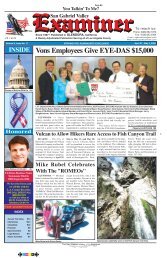B December 8 - 14 11.pmd - San Gabriel Valley Examiner
B December 8 - 14 11.pmd - San Gabriel Valley Examiner
B December 8 - 14 11.pmd - San Gabriel Valley Examiner
You also want an ePaper? Increase the reach of your titles
YUMPU automatically turns print PDFs into web optimized ePapers that Google loves.
B8<br />
S.G.V. EXAMINER<br />
To Reduce Your Carbon<br />
Footprint, Ride The Bus<br />
Riding the bus instead of driving can be one of the best ways to reduce your carbon footprint.<br />
To put yourself on the road<br />
to preserving the ecology and<br />
your own economy, it may pay<br />
to take the bus.<br />
Public transit and school<br />
buses replace a significant<br />
number of cars on the road,<br />
making them an environmentally<br />
sound transportation option.<br />
Using public transportation<br />
saves the equivalent of 4.2<br />
billion gallons of gasoline annually.<br />
Research shows that<br />
by using public transit, the typical<br />
automobile driver can reduce<br />
individual daily carbon<br />
emissions by 20 pounds or<br />
more than 4,800 pounds per<br />
year. A single school bus can<br />
eliminate approximately 36<br />
cars. With more than 480,000<br />
school buses on the road each<br />
day, that's nearly 17.3 million<br />
fewer vehicles on the streets,<br />
saving an estimated 2.3 billion<br />
gallons of fuel each year as<br />
well as reducing congestion,<br />
emissions and road wear and<br />
tear.<br />
"Today's buses are more en-<br />
vironmentally friendly than<br />
ever before, thanks to cleanerburning<br />
engines, specialized<br />
particulate filters and alternative<br />
fuels," notes Gary<br />
Catapano, senior vice president<br />
for Safety at FirstGroup<br />
America, the largest provider<br />
of ground transportation services<br />
in North America.<br />
New fuel standards require<br />
the use of ultra-low sulfur diesel,<br />
which improves emissions<br />
and runs significantly cleaner.<br />
Emissions have been reduced<br />
from more than 500 parts per<br />
million to less than 15 with ultra-low<br />
sulfur diesel.<br />
Most of his company's<br />
buses "use ultra-low sulfur diesel<br />
and 750 run on compressed<br />
natural gas, an even cleanerrunning<br />
fuel than diesel," adds<br />
Catapano.<br />
Typical school bus engines<br />
burn about half a gallon of fuel<br />
per hour of idling. Cutting back<br />
on idling not only reduces emissions;<br />
it saves significantly on<br />
fuel costs. The school bus division<br />
strictly enforces an antiidling<br />
policy, stating that no bus<br />
will idle in excess of three minutes<br />
while not in transit unless<br />
certain exceptions exist.<br />
Transportation companies<br />
are taking other steps to reduce<br />
their carbon footprint<br />
through waste recycling programs.<br />
For example,<br />
Catapano's company's program<br />
recycles more than<br />
250,000 pounds of used oil filters<br />
annually throughout North<br />
America and will recycle<br />
enough used oil to eliminate<br />
5,000 metric tons of greenhouse<br />
gases a year. The company<br />
recycles 7 percent of all<br />
waste including cardboard and<br />
glass, which represents more<br />
than 20,000 cubic yards per<br />
year of material that's not going<br />
into landfills.<br />
You can learn more about<br />
how green a bus can be online<br />
at www.firstgroupamerica.com.<br />
(NAPSA)<br />
Conserve Water: Tips To Help<br />
For homeowners-especially<br />
those who live in drier regionssaving<br />
water is an important issue.<br />
Americans use an average<br />
of 101 gallons of water every<br />
day, five times as much water<br />
as is needed to maintain basic<br />
necessities. A considerable<br />
amount of that water is spent<br />
keeping lawns and gardens<br />
green and lush.<br />
Watering lawns and gardens<br />
can account for up to half of<br />
the 95,000 gallons of water<br />
used by households yearly.<br />
Smart watering habits-along<br />
with weather-based irrigation<br />
products-can save 30 to 70<br />
percent of that water. Here<br />
are some water-saving ideas:<br />
1. Don't drown your lawn.<br />
Instead of watering for one<br />
long session, water a few times<br />
for shorter periods and take 15minute<br />
breaks in between each<br />
session.<br />
2. Watch the clock. Water<br />
between 5 a.m. and 10 a.m.when<br />
the sun is low, winds are<br />
calm and temperatures are<br />
cool. Midday watering tends to<br />
be less efficient due to evaporation,<br />
while watering in the<br />
evening can encourage the<br />
growth of fungus.<br />
3. Divide by zones. Different<br />
plants need different<br />
amounts of water. Both sprinkler<br />
and drip irrigation can be<br />
incorporated to achieve more<br />
efficient use of water.<br />
4. Water only things that<br />
grow. If you have an underground<br />
sprinkler system, make<br />
sure the sprinkler heads are adjusted<br />
properly to avoid watering<br />
sidewalks and driveways.<br />
A properly adjusted sprinkler<br />
head should spray large droplets<br />
of water instead of a fine<br />
mist.<br />
5. Consider dripping. When<br />
it comes to watering individual<br />
trees, flowerbeds, potted containers<br />
or other nongrassy areas,<br />
consider applying water<br />
directly to the roots using lowvolume<br />
drip irrigation.<br />
6. Do routine inspections.<br />
Periodically check your sprinklers<br />
to make sure everything<br />
is working properly. A clogged<br />
head or a torn line can wreak<br />
havoc on your landscape and<br />
water bill.<br />
7. Be rain smart. Use an irrigation<br />
system with a<br />
weather-based sensor. A<br />
weather sensor works with a<br />
smart controller to monitor<br />
temperature and rainfall and<br />
adjusts watering schedules accordingly.<br />
The controller uses<br />
a built-in database of weather<br />
information for the<br />
homeowner's specific geographic<br />
area to adjust watering<br />
needs all year long.<br />
For example, Rain Bird's<br />
SST Smart Irrigation Control<br />
System synthesizes a home's<br />
landscape watering needs and<br />
on-site weather conditions to<br />
give lawns and gardens the<br />
precise amount of water required.<br />
For more information, visit<br />
www.rainbird.com.<br />
One smart way to conserve<br />
water when irrigating your garden<br />
is to install a shutoff device<br />
that automatically detects<br />
rain or moisture. (NAPSA)<br />
Doctors Urge Action<br />
Against Deadly Infections<br />
(NAPSA)-America can avoid<br />
a scary future-if we learn to<br />
turn things around soon when<br />
it comes to antibiotic drug resistance.<br />
Government and medical experts<br />
are growing increasingly<br />
alarmed about the rapid spread<br />
of deadly infections caused by<br />
"superbugs," bacteria that have<br />
outsmarted the antibiotics used<br />
to treat them. Medical advances<br />
made possible by antibioticssuch<br />
as surgery, chemotherapy,<br />
organ transplants and care of<br />
premature babies-are in jeopardy.<br />
The World Health Organization<br />
has ranked antimicrobial<br />
drug resistance among the<br />
greatest threats to human health<br />
on the planet. Drug resistance<br />
costs the U.S. $21 billion to $34<br />
billion every year.<br />
Just one superbug, methicil-<br />
lin-resistant Staphylococcus<br />
aureus, or "MRSA," kills 19,000<br />
Americans each year. That is<br />
more than emphysema, HIV/<br />
AIDS, Parkinson's disease, and<br />
homicide combined. MRSA has<br />
learned how to defend itself<br />
against antibiotics. This makes<br />
it much harder for doctors to<br />
protect people from serious infections.<br />
MRSA is harming<br />
healthy people and those who<br />
are ill from other diseases. Other<br />
bacterial infections are becoming<br />
even harder to treat.<br />
Many factors are to blame,<br />
including overuse and misuse of<br />
antibiotics. New antibiotics<br />
aren't being developed fast<br />
enough to protect everyday<br />
Americans from these dangerous<br />
superbugs. Experts say this<br />
public health crisis is only going<br />
to get worse. Soon we will<br />
have no antibiotics left to treat<br />
our children and grandchildrenunless<br />
we ask Congress to pass<br />
laws to protect us.<br />
"The ways we have produced<br />
and used antibiotics for<br />
70 years are failing us. We must<br />
act now, or we will end up back<br />
in the dark ages of health care<br />
and everybody will wonder why<br />
nothing was done," said Jim<br />
Hughes, M.D., president of the<br />
Infectious Diseases Society of<br />
America (IDSA), a national organization<br />
of infectious diseases<br />
physicians and scientific experts.<br />
"The good news is we<br />
have a rescue plan, but we need<br />
help convincing leaders in Congress,<br />
the federal government<br />
and the health care industry."<br />
IDSA's rescue plan, "Combating<br />
Antimicrobial Resistance:<br />
Policy Recommendations to<br />
Save Lives," supports both economic<br />
incentives to encourage<br />
If you can remember the<br />
Kennedy administration, the<br />
Beatles on "The Ed Sullivan<br />
Show," <strong>San</strong>dy Koufax pitching<br />
or the first moon landing,<br />
chances are you're a baby<br />
boomer.<br />
Born between 1946 and<br />
1964, baby boomers are some<br />
80 million strong. The generation,<br />
often referred to as the<br />
hardest working, has played a<br />
significant role in shaping the<br />
cultural, social and consumerfocused<br />
society of today.<br />
Spending more than $2 trillion<br />
on consumer goods each year,<br />
this group knows what it wants<br />
and where to get it.<br />
Increasingly, boomers are<br />
re-embracing the good old<br />
days, searching out content<br />
and products that remind them<br />
of a better time: the television<br />
shows they watched, the<br />
breakfast cereal they ate, the<br />
songs they listened to.<br />
Major companies are taking<br />
note and reintroducing classic<br />
items. TV shows from "Hawaii<br />
Five-O" to "Charlie's Angels"<br />
are back in the mainstream<br />
entertainment lineup<br />
while "Mad Men" has capitalized<br />
on the glory days of 1960s<br />
advertising.<br />
Nowhere is the popularity of<br />
nostalgia as evident as on the<br />
Internet. A wide array of<br />
websites has surfaced to supply<br />
boomers with classic content<br />
ranging from vintage prom<br />
attire to family photos.<br />
In response to the nostalgic<br />
bent of its 55 million members,<br />
venerable social networking<br />
site Classmates.com acquired<br />
The <strong>San</strong> <strong>Gabriel</strong> <strong>Valley</strong> <strong>Examiner</strong><br />
<strong>December</strong> 8 - <strong>14</strong>, 2011<br />
Nostalgia Is Better Than Ever<br />
In the board game "Jenga,"<br />
players try to remove sections<br />
of an assembled tower without<br />
sending the structure<br />
crashing to the floor. Those<br />
who keep their towers standing<br />
can win.<br />
Isabelle Cherney, Ph.D., the<br />
director of the new Interdisciplinary<br />
Doctorate in Education<br />
(Ed.D.) Program in Leadership<br />
at Creighton University,<br />
likens good leadership to this<br />
board game: shaping and<br />
adapting the organization in<br />
ways to improve it-without<br />
damaging and, even better,<br />
while enhancing, the whole.<br />
A top tier university,<br />
Creighton's approach to education<br />
creates a passion for<br />
learning and a zeal for making<br />
a difference, while its focus on<br />
the development of ethical and<br />
spiritual values produces<br />
graduates who are highly motivated<br />
to succeed and make a<br />
lasting impact in their chosen<br />
career field.<br />
Pulling together faculty and<br />
an array of national standouts<br />
from the fields of arts and sciences,<br />
business, pharmacy and<br />
health professions, medicine<br />
and law, the school now offers<br />
a new doctorate, designed to<br />
be strongly interdisciplinary in<br />
its teaching of leadership.<br />
Cherney believes a strength<br />
of the program is its interdisciplinary<br />
nature, which encourages<br />
a broadened, socially<br />
aware perspective across the<br />
curriculum. In a globalized society<br />
facing financial, environmental,<br />
and social hardships,<br />
farsighted and ethical leaders<br />
devise strategies for growth<br />
Iconic magazines such as SPORT can now be found online.<br />
a huge assortment of vintage<br />
content to transform itself into<br />
Memory Lane.com. The new<br />
website features the largest<br />
archive of nostalgic content on<br />
the Internet, letting boomers<br />
relive six decades of Americana<br />
from the 1940s through<br />
the 1990s with over 100 million<br />
pieces of content.<br />
The site now offers vintage<br />
magazines such as SPORT<br />
and The Saturday Evening<br />
Post, historic Universal newsreels<br />
and clips to the music that<br />
provided the sound track to so<br />
many boomers' lives. Boomers<br />
can also explore over 70,000<br />
digitized high school yearbooks<br />
covering over 30 million people<br />
who graduated from a U.S.<br />
high school before 1989.<br />
A visit to MemoryLane.com<br />
has been compared to stepping<br />
into an Internet time machine<br />
where visitors can explore, discover<br />
and connect with the<br />
iconic moments that formed<br />
America's history-and their<br />
own. Boomers can relive the<br />
events that helped shape their<br />
lives through the tremendous<br />
amount of images, videos, music,<br />
magazines and other content<br />
preserved at<br />
www.MemoryLane.com with<br />
a simple click of a mouse.<br />
(NAPSA)<br />
Building Leaders For The Greater Good<br />
new antibiotics and programs to<br />
ensure that the drugs we have<br />
are used wisely. IDSA is aiming<br />
for 10 new antibiotics approved<br />
by 2020.<br />
You can learn more about<br />
IDSA's plan and how to contact<br />
your representatives in Congress<br />
at www.capwiz.com/<br />
idsociety/ issues/alert/<br />
?alertid=7478136.<br />
and change that merge with<br />
goals for the common good.<br />
Graduates of the new doctoral<br />
program have open to<br />
them many possibilities across<br />
the broad fields of education,<br />
business and health care,<br />
Cherney points out.<br />
"The Interdisciplinary Ed.D.<br />
Program in Leadership was<br />
specifically developed as a diverse,<br />
generalist degree that<br />
can be applied to any occupation.<br />
The possibilities are endless,"<br />
Cherney says.<br />
In education, for instance,<br />
opportunities include, but are<br />
not limited to, careers as school<br />
principals or superintendents,<br />
deans or vice presidents; in<br />
business, directors of human<br />
resources, or program managers;<br />
in health care, directors of<br />
clinical education or clinical<br />
residency.<br />
Cherney believes the new<br />
doctorate not only will break<br />
new ground in the field of leadership<br />
training. Probably the<br />
program's greatest strength<br />
and, indeed, its distinctiveness,<br />
Cherney says, is its tie to the<br />
Jesuit mission: Preparing<br />
graduates to lead wisely for<br />
the greater good.<br />
Covering 60 credit hours, the<br />
program is reaching out to an<br />
array of people who are "learning<br />
from each other," Cherney<br />
adds.<br />
Almost exclusively online<br />
(students will come to campus<br />
to meet in the summer and<br />
again at the close of the program),<br />
the new doctorate lets<br />
students solve problems not<br />
only within their own organizations,<br />
but outside of their areas<br />
of expertise.<br />
Cherney explains, "We<br />
want the students to reach out<br />
of their comfort zones and<br />
their backgrounds to work on<br />
something that needs changing"<br />
for the better.<br />
The leadership program is<br />
divided into eight-week modules<br />
online. The first seven<br />
modules are in sequence, followed<br />
by a more open schedule.<br />
From the beginning, students<br />
are in touch with each other<br />
online but they've also scrutinized<br />
themselves.<br />
The first course, Cherney<br />
explains, involves finding one's<br />
own strengths. Leaders must<br />
know themselves before leading<br />
others, she believes. Only<br />
then do you learn how others<br />
work best.<br />
Because the degree is<br />
online, students will be working<br />
while they're taking the<br />
courses. This means their dayto-day<br />
experience is also a<br />
laboratory to put into practice<br />
what they're learning at<br />
Creighton.<br />
Today, a successful leader,<br />
Cherney asserts, must understand<br />
the different social backgrounds<br />
that come together in<br />
a given organization. She also<br />
believes that good leaders today<br />
must work with limited financial<br />
resources and be able<br />
to prioritize the lists of needs<br />
within strained budgets. They<br />
must also make good employment<br />
decisions and understand<br />
how new technology can<br />
change social relationships at<br />
work.<br />
Legal issues and new regulations<br />
from government, including<br />
those in health care,<br />
also are affecting the workplace<br />
today, says Cherney, and<br />
shaping the decisions leaders<br />
make.<br />
For more information on the<br />
new Interdisciplinary Doctorate<br />
in Education (Ed.D.) Program<br />
in Leadership, visit<br />
www.creighton-online.com or<br />
call (866) 717-6365 to speak<br />
with an admissions representative.<br />
(NAPSA)<br />
Kyle A. Cline<br />
626-335-0815<br />
Insurance Lic. #: OD16727



